Items filtered by date: December 2024
Symptoms and Causes of Flat Feet
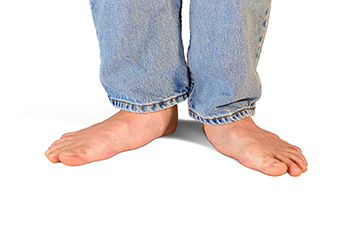
Flat feet, also called fallen arches, occur when the arch of the foot is lower than normal or completely flattened, causing the sole to touch the ground. While this condition is common in children as their arches develop, some people retain flat feet into adulthood. Others develop flat feet later in life due to aging, obesity, diabetes, or arthritis. Flat feet symptoms include pain in the arch, heel, or ankle, swelling, stiffness, and uneven wear on shoes. In some cases, the altered alignment of the feet can affect stability, increasing the risk of tripping or causing discomfort during activity. A podiatrist can diagnose flat feet by examining foot structure and movement. This foot doctor may recommend orthotics, which are custom shoe inserts designed to support the arch, improve foot alignment, and reduce pressure on the feet and ankles. Wearing supportive footwear can also help minimize discomfort. If you are experiencing pain caused by having flat feet, it is suggested that you schedule an appointment with a podiatrist for a diagnosis and treatment options.
Flatfoot is a condition many people suffer from. If you have flat feet, contact the foot specialists from Marvel Foot & Ankle Centers. Our doctors will treat your foot and ankle needs.
What Are Flat Feet?
Flatfoot is a condition in which the arch of the foot is depressed and the sole of the foot is almost completely in contact with the ground. About 20-30% of the population generally has flat feet because their arches never formed during growth.
Conditions & Problems:
Having flat feet makes it difficult to run or walk because of the stress placed on the ankles.
Alignment – The general alignment of your legs can be disrupted, because the ankles move inward which can cause major discomfort.
Knees – If you have complications with your knees, flat feet can be a contributor to arthritis in that area.
Symptoms
- Pain around the heel or arch area
- Trouble standing on the tip toe
- Swelling around the inside of the ankle
- Flat look to one or both feet
- Having your shoes feel uneven when worn
Treatment
If you are experiencing pain and stress on the foot you may weaken the posterior tibial tendon, which runs around the inside of the ankle.
If you have any questions please feel free to contact our offices located in Gilbert and Chandler, AZ . We offer the newest diagnostic and treatment technologies for all your foot and ankle needs.
Preventing Sever’s Disease in Growing Feet
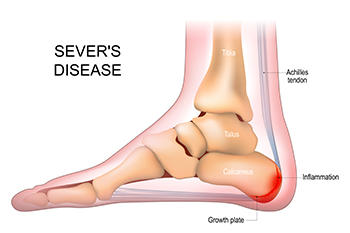
Sever’s disease, or calcaneal apophysitis, is a common cause of heel pain in children and adolescents, especially during growth spurts. It occurs when the heel bone grows faster than the surrounding muscles and tendons, creating tension and inflammation at the growth plate where the Achilles tendon attaches to the heel. Activities like running, jumping, or sports with repetitive impact can worsen this condition. To protect young feet, ensure children wear properly cushioned, supportive footwear during activities. Stretching exercises for the calves and hamstrings can relieve tension on the heel. Avoid overtraining or prolonged high-impact sports, and encourage rest if pain arises. If your child is complaining of heel pain, it is suggested that you schedule an appointment with a podiatrist for an accurate diagnosis and personalized treatment plan, keeping kids active while reducing the risk of long-term discomfort.
Sever's disease often occurs in children and teens. If your child is experiencing foot or ankle pain, see the foot specialists from Marvel Foot & Ankle Centers. Our doctors can treat your child’s foot and ankle needs.
Sever’s Disease
Sever’s disease is also known as calcaneal apophysitis, which is a medical condition that causes heel pain I none or both feet. The disease is known to affect children between the ages of 8 and 14.
Sever’s disease occurs when part of the child’s heel known as the growth plate (calcaneal epiphysis) is attached to the Achilles tendon. This area can suffer injury when the muscles and tendons of the growing foot do not keep pace with bone growth. Therefore, the constant pain which one experiences at the back of the heel will make the child unable to put any weight on the heel. The child is then forced to walk on their toes.
Symptoms
Acute pain – Pain associated with Sever’s disease is usually felt in the heel when the child engages in physical activity such as walking, jumping and or running.
Highly active – Children who are very active are among the most susceptible in experiencing Sever’s disease, because of the stress and tension placed on their feet.
If you have any questions, please feel free to contact our offices located in Gilbert and Chandler, AZ . We offer the newest diagnostic and treatment technologies for all your foot and ankle injuries.
Managing Foot Blisters
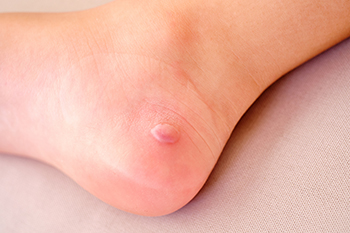
Blisters on the feet are small, fluid-filled pockets that form beneath the outer layer of skin, often caused by friction or pressure. These painful lesions can occur from wearing ill-fitting shoes or repetitive movements during activities. Blisters on the feet are typically filled with clear fluid, though blood-filled blisters can develop if a nearby blood vessel is damaged. While small blisters often heal on their own when kept clean and covered, larger or infected blisters require attention, particularly if accompanied by redness, warmth, or drainage. Popping a blister is not recommended as it can lead to infection and further complications. A podiatrist can provide safe and sterile treatment to treat the blister, reduce pain and prevent infection. This foot doctor can also assess your footwear and recommend methods to minimize friction to prevent future blister formation. If you have a painful blister that will not heal, it is suggested that you schedule an appointment with a podiatrist for an exam and treatment.
Blisters are prone to making everyday activities extremely uncomfortable. If your feet are hurting, contact the foot specialists of Marvel Foot & Ankle Centers. Our doctors can provide the care you need to keep you pain-free and on your feet.
Foot Blisters
Foot blisters develop as a result of constantly wearing tight or ill-fitting footwear. This happens due to the constant rubbing from the shoe, which can often lead to pain.
What Are Foot Blisters?
A foot blister is a small fluid-filled pocket that forms on the upper-most layer of the skin. Blisters are filled with clear fluid and can lead to blood drainage or pus if the area becomes infected.
How Do Blisters Form?
Blisters on the feet are often the result of constant friction of skin and material, usually by shoe rubbing. Walking in sandals, boots, or shoes that don’t fit properly for long periods of time can result in a blister. Having consistent foot moisture and humidity can easily lead to blister formation.
Prevention & Treatment
It is important to properly care for the affected area in order to prevent infection and ease the pain. Do not lance the blister and use a Band-Aid to provide pain relief. Also, be sure to keep your feet dry and wear proper fitting shoes. If you see blood or pus in a blister, seek assistance from a podiatrist.
If you have any questions, please feel free to contact our offices located in Gilbert and Chandler, AZ . We offer the newest diagnostic and treatment technologies for all your foot care needs.
Understanding Athlete's Foot
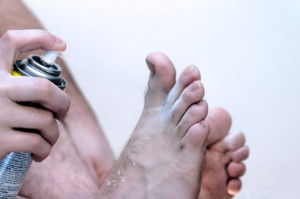
Athlete’s foot is a fungal infection that typically affects the skin between the toes but can spread to other areas of the body. There are different types of athlete’s foot infections, including interdigital, meaning between the toes, moccasin, which affects the soles and sides of the feet, or vesicular, which is characterized by fluid-filled blisters. Common symptoms include itching, burning, redness, cracked skin, and peeling. The main cause of athlete’s foot is exposure to the fungus tinea pedis, often found in warm, damp environments like locker rooms, public showers, or wet socks and shoes. Poor foot hygiene and weakened immune systems can increase the risk. Treatment typically includes antifungal creams, powders, or oral medications. In some cases, if the infection is severe or persistent, a podiatrist may recommend a more tailored treatment plan. A podiatrist can also help with prevention strategies to reduce the risk of recurrence. If you are struggling with athlete’s foot, it is suggested that you schedule an appointment with a podiatrist for relief and expert care.
Athlete’s foot is an inconvenient condition that can be easily reduced with the proper treatment. If you have any concerns about your feet and ankles, contact the foot specialists from Marvel Foot & Ankle Centers. Our doctors will treat your foot and ankle needs.
Athlete’s Foot: The Sole Story
Athlete's foot, also known as tinea pedis, can be an extremely contagious foot infection. It is commonly contracted in public changing areas and bathrooms, dormitory style living quarters, around locker rooms and public swimming pools, or anywhere your feet often come into contact with other people.
Solutions to Combat Athlete’s Foot
- Hydrate your feet by using lotion
- Exfoliate
- Buff off nails
- Use of anti-fungal products
- Examine your feet and visit your doctor if any suspicious blisters or cuts develop
Athlete’s foot can cause many irritating symptoms such as dry and flaking skin, itching, and redness. Some more severe symptoms can include bleeding and cracked skin, intense itching and burning, and even pain when walking. In the worst cases, Athlete’s foot can cause blistering as well. Speak to your podiatrist for a better understanding of the different causes of Athlete’s foot, as well as help in determining which treatment options are best for you.
If you have any questions please feel free to contact our offices located in Gilbert and Chandler, AZ . We offer the newest diagnostic and treatment technologies for all your foot and ankle needs.
Heel Pain in the Morning?
Managing Corns or Calluses
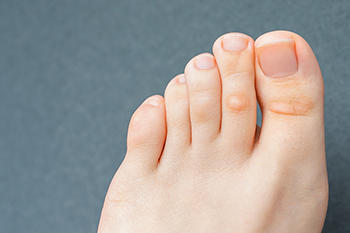
Corns and calluses are common foot conditions that develop due to friction and pressure on the skin. Corns are small, hardened areas of skin that typically form on the top or sides of toes, while calluses are thicker patches of skin that usually appear on the soles of the feet. Both conditions are the body’s natural response to protect itself from rubbing or pressure, often caused by wearing ill-fitting shoes, abnormal gait, or high-impact activities. Symptoms include thickened skin, tenderness, pain when walking, and in some cases, redness or inflammation. While mild treatments like padding or foot creams might help, improper removal can worsen the condition. A podiatrist can provide safe, effective treatment by carefully trimming corns and calluses, recommending custom orthotics to alleviate pressure, and offering advice on proper footwear. If you have persistent foot discomfort, or if corns or calluses are affecting your daily life, it is suggested that you schedule an appointment with a podiatrist for expert care and relief.
If you have any concerns regarding your feet and ankles, contact the foot specialists of Marvel Foot & Ankle Centers. Our doctors will treat your foot and ankle needs.
Corns: What Are They? and How Do You Get Rid of Them?
Corns can be described as areas of the skin that have thickened to the point of becoming painful or irritating. They are often layers and layers of the skin that have become dry and rough, and are normally smaller than calluses.
Ways to Prevent Corns
There are many ways to get rid of painful corns such as wearing:
- Well-fitting socks
- Comfortable shoes that are not tight around your foot
- Shoes that offer support
Treating Corns
Treatment of corns involves removing the dead skin that has built up in the specific area of the foot. Consult with Our doctors to determine the best treatment option for your case of corns.
If you have any questions please feel free to contact our offices located in Gilbert and Chandler, AZ . We offer the newest diagnostic and treatment technologies for all your foot and ankle needs.

